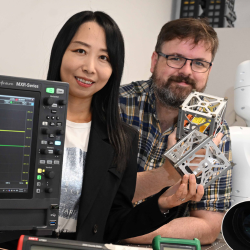-
Study
-
Undergraduate
- Search for a Course
- Undergraduate Open Day & Events
- Application Guides
- Northumbria University UCAS Exhibitions
- Foundation Years
- Undergraduate Fees & Funding
- School & College Outreach
- Continuing Professional Development
-
Postgraduate
- Postgraduate Study Degree
- Postgraduate Research Degrees
- Postgraduate Open Days and Events
- Postgraduate Fees & Funding
- Flexible Learning
- Thinking about a Masters?
- Continuing Professional Development
- Change Direction
-
Student Life
- The Hub - Student Blog
- Accommodation
- Life in Newcastle
- Support for Students
- Careers
- Information for Parents
- Students' Union
- Northumbria Sport
- Be Part of It
-
-
International
International
Northumbria’s global footprint touches every continent across the world, through our global partnerships across 17 institutions in 10 countries, to our 277,000 strong alumni community and 150 recruitment partners – we prepare our students for the challenges of tomorrow. Discover more about how to join Northumbria’s global family or our partnerships.
View our Global Footprint-
Applying to Northumbria
- European Union
- Our London Campus
- Northumbria Pathway
- International Events
- Entry Requirements and Country Representatives
- Regional Offices
-
Northumbria Language Centre
- Faculty Requirements
- Acceptable English Requirements
- Pre-sessional English Language and Study Skills
- Academic Language Skills Programmes (ALS)
-
International Fees, Funding & Scholarships
- International Undergraduate Fees
- International Undergraduate Funding
- International Masters Fees
- International Masters Funding
- International Postgraduate Research Fees
- International Postgraduate Research Funding
- International Money Matters
-
Life at Northumbria
- International student support
- Careers
-
International Mobility
- Current Northumbria Students
- Incoming Exchange Students
-
-
Business
Business
The world is changing faster than ever before. The future is there to be won by organisations who find ways to turn today's possibilities into tomorrows competitive edge. In a connected world, collaboration can be the key to success.
More on our Business Services -
Research
Research
Northumbria is a research-rich, business-focused, professional university with a global reputation for academic quality. We conduct ground-breaking research that is responsive to the science & technology, health & well being, economic and social and arts & cultural needs for the communities
Discover more about our Research -
About Us
-
About Northumbria
- Our Strategy
- Our Staff
- Place and Partnerships
- Student Profiles
- Alumni Profiles
- Leadership & Governance
- Academic Departments
- University Services
- History of Northumbria
- Contact us
- Online Shop
-
-
Alumni
Alumni
Northumbria University is renowned for the calibre of its business-ready graduates. Our alumni network has over 244,000 graduates based in 178 countries worldwide in a range of sectors, our alumni are making a real impact on the world.
Our Alumni - Work For Us
What will I learn on this module?
This module introduces you to the fundamentals of computer networks, security and operating systems, including: network architecture and the five-layer Internet protocol stack, processes/threads, inter-process communication, memory management, file systems, and operating systems and network security. You will study:
* network architecture: the five-layer Internet protocol stack (application, transport, network, datalink, and physical layers), switching techniques (e.g. circuit and packet), protocols (e.g. TCP, UDP, IP);
* processes and threads: concepts, use and implementation, creation and destruction, context switching, scheduling, synchronisation;
* inter-process communication: shared memory, message passing, pipes, sockets;
* memory management: memory allocation schemes, paging, virtual memory;
* file systems: file concept, file system structure and implementation, directories, free space allocation;
* operating system and network security: confidentiality, integrity, availability, threats and attacks (e.g. denial of service, spoofing, man-in-the-middle), access control, user authentication, cryptography for data and network security, secure network protocols (e.g. TLS/SSL).
How will I learn on this module?
Your taught sessions will be delivered in a well-equipped computing laboratory, where you will have full access to a modern operating system and network for investigation and experimentation. Fundamental concepts and theory will be introduced in lectures. Laboratory sessions will offer ample opportunity for practical exercises to reinforce and extend your understanding. Guided learning activities will provide you with further opportunities to develop your understanding and practical ability.
How will I be supported academically on this module?
You will be given advice and feedback on your work and progress during scheduled taught sessions. You will have opportunities to discuss your work with academic staff and with your colleagues. In addition, the eLP (electronic learning portal) will be used to provide access to extensive support materials.
What will I be expected to read on this module?
All modules at Northumbria include a range of reading materials that students are expected to engage with. Online reading lists (provided after enrolment) give you access to your reading material for your modules. The Library works in partnership with your module tutors to ensure you have access to the material that you need.
What will I be expected to achieve?
Knowledge & Understanding:
1. Demonstrate knowledge and critical understanding of networking fundamentals, including network architecture and protocols.
2. Demonstrate knowledge and critical understanding of the fundamentals of an operating system, including its architecture and the implementation of its services.
3. Demonstrate knowledge and critical understanding of operating systems and network security, including fundamental concepts, threats, attacks and basic techniques for defence.
Intellectual / Professional skills & abilities:
4. Interpret a requirements specification to design and develop a networked application program, using standard operating systems and networking APIs (e.g. POSIX.1-2008), and demonstrating cognisance of security issues and industry best practice.
Personal Values Attributes (Global / Cultural awareness, Ethics, Curiosity) (PVA):
5. Communicate the results of work/study reliably and accurately.
How will I be assessed?
Formative assessment comprises a variety of theoretical and practical exercises, with opportunities for discussion with tutors and colleagues.
Summative assessment comprises a single coursework assignment. You will be required to develop a networked application program and to write a short report (~1000-1500 words), demonstrating your critical understanding of the work done and of fundamental principles and concepts, using your own research of the academic and technical literature where appropriate.
Feedback on formative assessment will be given during the workshop sessions. Formal written feedback will be provided on summative assessment. The assignment will assess all of the MLOs.
Pre-requisite(s)
None
Co-requisite(s)
None
Module abstract
Computer networks and operating systems deliver essential services for the Internet-enabled applications of the modern world.
Whether it's video streaming applications on your laptop, messaging apps on your smartphone or web servers in huge data centres, all rely on the services of an operating system and a computer network. The security of your data has never been more important nor more threatened than it is today. This module will help you to understand the main ideas of networks and operating systems, and how to use their services to develop secure networked applications. You will be taught in well-equipped computing laboratories with modern operating systems and networks that you can investigate and experiment with. Your understanding of key concepts and your practical skills will be assessed by a single coursework assignment in which you will develop a networked application and demonstrate your critical understanding in a short report. This module will help you to develop a sound understanding of key concepts for the age of the Internet and will inform your thinking at every stage of your computing career.
Course info
UCAS Code G404
Credits 20
Level of Study Undergraduate
Mode of Study 3 years Full Time or 4 years with a placement (sandwich)/study abroad
Department Computer and Information Sciences
Location City Campus, Northumbria University
City Newcastle
All information is accurate at the time of sharing.
Full time Courses are primarily delivered via on-campus face to face learning but could include elements of online learning. Most courses run as planned and as promoted on our website and via our marketing materials, but if there are any substantial changes (as determined by the Competition and Markets Authority) to a course or there is the potential that course may be withdrawn, we will notify all affected applicants as soon as possible with advice and guidance regarding their options. It is also important to be aware that optional modules listed on course pages may be subject to change depending on uptake numbers each year.
Contact time is subject to increase or decrease in line with possible restrictions imposed by the government or the University in the interest of maintaining the health and safety and wellbeing of students, staff, and visitors if this is deemed necessary in future.
Useful Links
Find out about our distinctive approach at
www.northumbria.ac.uk/exp
Admissions Terms and Conditions
northumbria.ac.uk/terms
Fees and Funding
northumbria.ac.uk/fees
Admissions Policy
northumbria.ac.uk/adpolicy
Admissions Complaints Policy
northumbria.ac.uk/complaints














